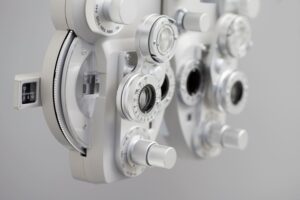While all women are different, they all have one thing in common: an increased risk for eye diseases. Did you know:
- On average, women live longer than men and many eye diseases are brought on due to aging.
- In the U.S., 63% of those that are blind and 62% of those visually impaired are women.
- Common eye diseases that affect women include age-related macular degeneration, cataracts, glaucoma, and dry eye.

Women’s Eye Health: Aging and Our Eyes
As we age, our eyes age too. Women 50 years and older are at an increased risk for age-related macular degeneration. Additionally, women going through menopause and in post menopause are more likely to experience dry eye.
What is Age-Related Macular Degeneration (AMD)?
Age-Related Macular Degeneration (AMD) is a chronic condition that affects adults’ central vision over time. AMD affects the macula of our eye (located on the retina). Caucasian women are at the highest risk for AMD as they age. AMD can lead to severe visual impairment and vision loss.
What is Dry Eye?
Dry eye is a condition that occurs when the eyes do not produce enough tears or the consistency of tears is not effective in lubricating the eye. Symptoms of dry eye include: burning or stinging of the eyes, a sandy/gritty feeling in the eye, blurred vision, and excess tear production followed by extreme dry periods.
Prevention and Treatment of Dry Eye
While there is no cure for dry eye, there are methods people can use to decrease the severity of the symptoms:
- Avoid cigarette smoke
- Take fish oil supplements
- Use a humidifier in your room to keep extra moisture in the air
- Use over-the-counter artificial tears/ointment but only if prescribed by your eye doctor
Pregnancy and Your Vision
If you are pregnant, it is important to be aware of your vision health. Due to frequent fluctuating blood sugar levels and hormonal changes, pregnant women are at an increased risk for vision complications.

Diabetes and Pregnancy
If you have diabetes before becoming pregnant, it is highly recommended to receive an eye exam during the first trimester. This is to monitor if any signs of retinopathy are occurring. Some women may form gestational diabetes (diabetes that occurs during pregnancy.) If you experience any changes in vision, it is recommended to discuss it with your eye doctor.

Pregnancy Induced Hypertension
Some women may experience vision changes with PIH. Common symptoms include blurred vision and seeing spots in your central vision. If you experience any of these symptoms, talk with your eye doctor to ensure it is being monitored.

Vision Complications in Newborns
Women who partake in behaviors such as smoking, drug use, or drinking during pregnancy, put their child at an increased risk for vision concerns after birth. These behaviors can cause the child to be born prematurely, or at a low-birth weight, increasing their risk for amblyopia (lazy eye), strabismus (crossed eye), or severe refractive errors as they grow and develop. It is recommended at well-child checkups to have the pediatrician conduct a vision screening and a red-light reflex test.
Cosmetics and Your Vision
Some women have had the same makeup in their makeup drawers for years. Let’s talk makeup tips!

Tip #1: Don’t use expired makeup
Similar to food, makeup does have an expiration date. The longer makeup sits, the greater its chances of forming bacteria. All makeup products have an expiration date on the back of their packaging. Eye makeup, including eyeliner and mascara, should be replaced every 4-6 months. Eye shadow has a longer shelf life and should be replaced every year. This helps prevent bacteria from forming in your makeup.

Tip #2: Don’t share makeup with others.
This is a sure way to share germs and bacteria. Your makeup should remain your makeup only.
Tip #3: Wash your face
Wash your makeup off immediately and throw it away if you notice any irritation forming in or around the eyes with a certain product.
Tip 4: Always remove your makeup before going to bed.
Primarily eye makeup should be removed before going to sleep.
Dilated Eye Exams
To prevent eye diseases and vision complications from occurring, women should receive dilated eye exams as recommended by their eye doctor. Dilated eye exams are the only way to check the entire health of the eye, making it one of the first lines of defense against eye diseases and preventable vision loss. Every individual’s eyes and vision health are different; it is recommended those not considered ‘at-risk’ for vision complications receive a dilated eye exam every 2-4 years.
‘At-risk’ for vision complications include the following populations:
- Adults 60 years of age and older
- African Americans and Hispanics/Latinos 40 years of age and older
- Adults diagnosed with diabetes (Type 1 or Type 2) or pre-diabetes
- Adults with diagnosed vision concerns/eye diseases
It is recommended if you fall into one of the categories above to receive dilated eye exam yearly.
